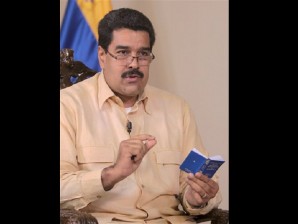Venezuela election fight to succeed Chavez begins
CARACAS—Venezuela was plunged into a bitter election fight to succeed Hugo Chavez on Monday, with acting President Nicolas Maduro and opposition leader Henrique Capriles facing off in a flurry of name-calling.
Thousands of the late president’s supporters massed outside the National Election Council as Maduro, dressed in a jacket in the colors of the Venezuelan flag, officially registered his candidacy.
“I am not Chavez, but I am his son and all of us together, the people, are Chavez,” he declared, attempting to ride a wave of popular emotion in the wake of his mentor’s death last week.
Maduro also vowed to make progress against gun crime, one of the top public concerns in this violence-wracked nation, which has a homicide rate eight times worse than the world average.
“There cannot be weapons to kill with, to use in hold-ups; that has got to stop,” he said, unveiling a plan to take weapons off streets of poorer neighborhoods.
Article continues after this advertisementWearing red berets and T-shirts emblazoned with Chavez’s image, his supporters vowed loyalty to the deeply polarizing socialist revolution that the former army paratrooper championed during his 14 years in power.
Article continues after this advertisement“We are going to elect Chavez in the body of Maduro,” said Jesus Oliviertt, a 60-year-old retiree. “We are going to continue his work.”
Capriles, an energetic 40-year-old state governor who lost to Chavez in presidential elections in October, kept his followers off the street but warned Maduro on Sunday: “I won’t leave you an open path.”
Later Monday, Capriles also formally registered his candidacy.
“This campaign is between you and me, Nicolas. Let’s leave the [late] president out of it,” Capriles said before promising supporters: “I do believe we can win.
“We are going to have to fight, but threats are not important. This fight is completely skewed,” he added.
Venezuelans will vote in snap April 14 elections after a brief campaign that analysts say heavily favors Maduro, whom Chavez picked as his successor in his last public appearance before going to Cuba for cancer surgery in December.
The Venezuelan president died on March 5 and was eulogized on Friday in a lavish state funeral that drew leaders from around Latin America and anti-American allies, including Iranian President Mahmoud Ahmadinejad.
Meanwhile, the US State Department announced the expulsion of two Venezuelan diplomats in a tit-for-tat response to the expulsion of two US Air Force officers by Venezuela last week.
Fidel Castro commented for the first time on the death of his close friend and ally, calling Chavez “the best friend Cuba ever had.”
Long lines of mourners have filed by his casket for a glimpse of the dead president, lying in state since Wednesday at a Caracas military academy.
Maduro says the government will embalm Chavez’s body to be viewed “like Lenin” in a glass casket “for eternity.”
Capriles, meanwhile, has accused Maduro of lying about the president’s health to buy time to prepare for the elections.
“Now on top of it all, you are using the body of the president to stage a political campaign,” he said Sunday.
Minutes later, Maduro went on state-run television, and, standing in front of a picture of Chavez in military uniform, accused his rival of trying to foment violence with “disgusting” accusations.
“His mask has fallen and we can see his nauseating fascist face,” he said, warning that the Chavez family was reserving the right to take “all legal action to defend the honor of president Hugo Chavez.”
“He is looking for the people of Venezuela to . . . go on the path of violence,” he alleged, urging Venezuelans to “not fall for provocations.”
Amid popular pressure to place Chavez alongside South American independence hero Simon Bolivar in the national pantheon, Maduro said he would propose a constitutional amendment to the legislature on Tuesday to move him there.
He called Chavez “the great redeemer of the poor.”
The move would lead to a referendum in 30 days that could coincide with the presidential election. The body will first be moved on Friday to a military museum where Chavez plotted a failed coup in 1992.
Luis Vicente Leon, director of pollsters Datanalisis, said the grief over Chavez’s death gives the government an advantage in the race.
“It will be a battle between the divine and the human,” he said.
Farith Fraija, a political scientist and blogger, told AFP: “It’s not a race between Capriles and Nicolas Maduro. It’s a race between Capriles and Chavez.”
Chavez defeated Capriles by 11 points in the October presidential election, but Capriles gave the opposition its best result ever against the president, garnering 44 percent of the vote.
A recent survey by pollster Hinterlaces gave Maduro a 14-point advantage over Capriles, though the opposition has questioned the firm’s reliability.
Capriles drew massive crowds during the last campaign, but Chavez was propelled to victory thanks to his popularity among the poor, who worshipped him for their oil-funded health care, housing and education.
Chavez’s expropriations and nationalizations of key industries riled the wealthy while the opposition accused him of abusing state funds and dominating state-run media in his campaigns.
